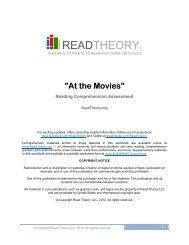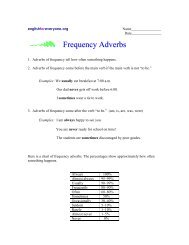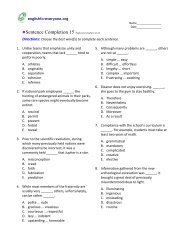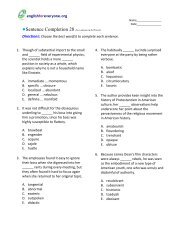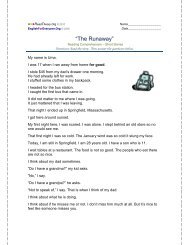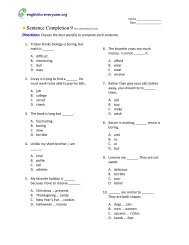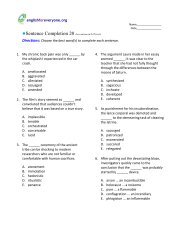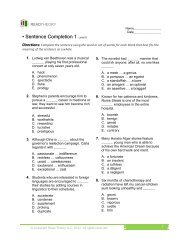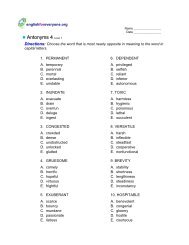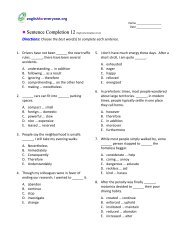“The Transfers” - English for Everyone
“The Transfers” - English for Everyone
“The Transfers” - English for Everyone
You also want an ePaper? Increase the reach of your titles
YUMPU automatically turns print PDFs into web optimized ePapers that Google loves.
transactions per week. This eliminates option (III). There<strong>for</strong>e (B) is correct.<br />
4) D<br />
In paragraph 2, we learn that Loren wore secondhand suits and rode his bike<br />
to work. In paragraph 3, the passage says Loren, “rarely traveled outside of<br />
the Washington, DC area. He did nothing at all to raise a red flag. He<br />
appeared as nothing more than an 18-dollar-an-hour bank employee in a<br />
town where many made millions.” Loren did not want to call attention to the<br />
fact that he was stealing money. In order to avoid sending signals that would<br />
make others suspicious, he has taken care to appear as if everything were<br />
normal. Using this in<strong>for</strong>mation, we can infer that to raise a red flag means to<br />
give a warning signal. There<strong>for</strong>e (D) is correct.<br />
Being guilty is being responsible <strong>for</strong> a crime. Since no one knew of the crime,<br />
Loren was trying to avoid anyone’s notice of the crime, not the fact that he<br />
was responsible <strong>for</strong> it. There<strong>for</strong>e (A) is incorrect. Loren did want to appear<br />
impoverished, or look poorer than he was, because he did not want to raise<br />
suspicion. There<strong>for</strong>e (B) is incorrect. Behaving consistently with his income<br />
would not make anyone appear smart or not smart. This means (C) is<br />
incorrect.<br />
5) C<br />
In paragraph 1, we learn that Loren has been stealing money and putting it<br />
into an account in the Cayman Islands. The passage says Loren “knew the<br />
money would be safe in an offshore account.” We can infer from this<br />
in<strong>for</strong>mation that Loren believed the money would be safe because it was in<br />
the Cayman Islands. This supports option (I). The passage does not suggest<br />
that Loren felt no one would suspect a bank teller of fraud. This eliminates<br />
option (II). In paragraphs 2 and 3, we learn that Loren has taken great care<br />
not to do anything that would show that he had more money than he should.<br />
This supports option (III). There<strong>for</strong>e (C) is the correct answer.<br />
6) D<br />
In paragraph 4, we learn that Loren has been taking $9000 every other week.<br />
Since we know that there are 52 weeks in a year, this means he takes $9000<br />
26 times a year <strong>for</strong> 8 years. $9000 x 26 x 8 = $1,872,000. There<strong>for</strong>e (D) is<br />
correct.<br />
$9000 is the amount Loren steals every other week, not the total amount.<br />
There<strong>for</strong>e (A) is incorrect. In paragraph 10 the passage says Loren “had<br />
close to $2 million collecting interest in the bank and had managed to pull it<br />
off, unscathed.” However, the question asks how much Loren would have<br />
stolen if he had taken the money <strong>for</strong> exactly eight years. $2 million is a close<br />
estimate but there is a more exact answer. We can multiply the amount Loren<br />
takes each week by the number of weeks he steals and get the exact<br />
number, which is not $2 million. There<strong>for</strong>e (B) is incorrect. Loren would have<br />
stolen $72,000 if he stole $9000 once a year <strong>for</strong> 8 years. However, Loren took<br />
the money every other week <strong>for</strong> 8 years. There<strong>for</strong>e (C) is incorrect.



